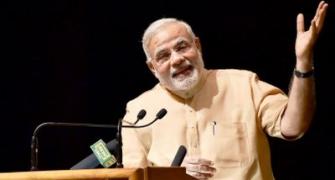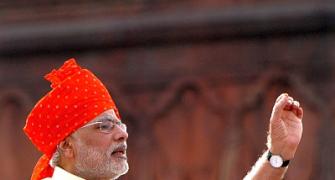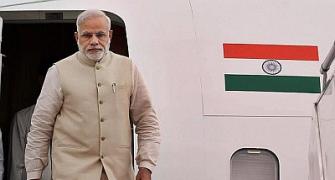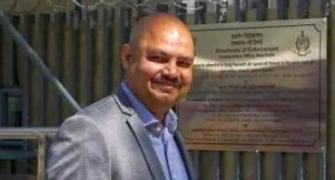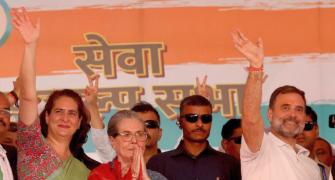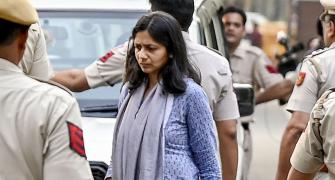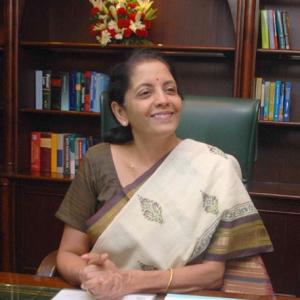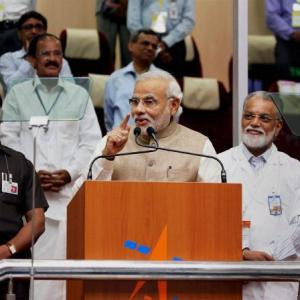'The RSS doesn't intervene, interfere or try to dominate government policy-making... The responsibility of running the government is entirely in the hands of the BJP.'
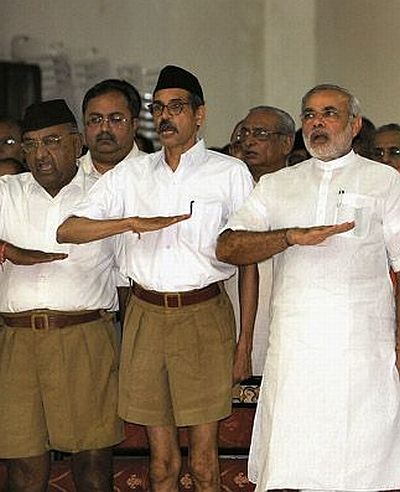 Last month, K N Govindacharya explained to Prasanna D Zore/Rediff.com why he had filed a petition against the government's reliance on social media sites like Facebook and Twitter.
Last month, K N Govindacharya explained to Prasanna D Zore/Rediff.com why he had filed a petition against the government's reliance on social media sites like Facebook and Twitter.
- Read Part 1 of the interview: 'The law of the land shall prevail on social media sites'
Govindacharya, a leading ideologue of the Sangh Parivar till he was banished for taking on then prime minister Atal Bihari Vajpayee, is also critical of the Modi government's decision to open the defence sector to private investment.
The concluding segment of Prasanna D Zore's telephone interview with Govindacharya:
Now that the BJP has a majority of its own in the Lok Sabha, do you think the party should push for contentious issues like the Uniform Civil Code, abrogation of Article 370 and a popular solution to the Ram Janmabhoomi-Babri Masjid issue that has been long pending?
The issues which now you are mentioning are no in any way directly related, particularly to social media. This is a different issue which can definitely be talked about and discussed on a different occasion.
And you would think that this is not the right occasion to talk about these issues?
I think I am trying to focus on the use of social media (by the government machinery).
Your views on Foreign Direct Investment in India have been at variance with the policies being implemented by the present government.
Exactly. About (FDI in) retail, some ways and means are being influenced by some foreign partisan interest.
About defence production (the Union Cabinet has approved 49 per cent FDI in defence from the existing 26 per cent), clarity needs to be sought about what are the essentials, what are the non-essentials or about the technology part.
What kind of technology transfers will be negotiated?
Till now, the vital technology related to advancement of computers, namely Param (a supercomputer that India built on its own), nuclear technology, space technology... Indian scientists, because of their own confidence, could evolve such technologies in these fields.
If this FDI will get us only non-essential items, they have to think market-wise also as to if there can be any cheaper technologies that can give us better results.
As far as the military aspect of technology transfers are concerned they have to be objectively re-evaluated and re-assessed before taking any position on the role of FDI in defence production.
The Union Cabinet has already approved 49 per cent FDI in defence...
It is like putting the cart before the horse.
The government should have come out about the range, sphere and scale of the technology to be used and FDI to be invested in. It requires more home work is what I mean.
You believe this was done in haste?
That's what I mean.
Why do you think more FDI in retail is not good for India?
It (FDI in retail) will kill the occupational potential livelihood in Bharat in which retail trade provides an important means of livelihood.
Retail trade in Bharat is not merely buying and selling of goods. It is a way of social interaction too. It has got its own cultural aspects too.
All these aspects have been neglected and retail has been viewed as a sales and purchase process, which is un-Indian.
There have been allegations that the Narendra Modi-led government is bending backwards to accommodate the RSS's views on national policy issues.
I don't think that is true.
The RSS doesn't intervene, interfere or try to dominate government policy-making. If its advice is sought, it may or may not respond.
The responsibility of running the government is entirely in the hands of the BJP.
Nobody is above or superior or an extra-Constitutional authority.
So the RSS has no role to play in policy-making? It can only advise, make suggestions...
No. No. No. No.
The RSS is confined to focussing on nation-building and character building of the youth. Imparting qualities of citizenship to the youth, inculcating the spirit of emotional and behavioural nationalism in the youth, an essence of pride in the country's ethos.
That is the RSS's sphere of work.
It doesn't want to extend itself to the wheels of politics. It could be that some Swayamsewaks could be working in the political field.
How would you assess Prime Minister Narendra Modi's tenure in office?
It is too early to do such assessments.
Your impressions about Mr Modi's foreign, economic and internal security policies...
The Nepal visit has been a historic occasion. For the first time, the cultural aspects have been highlighted, which is the strongest point in building the relationship between the two nations.
What are the highlights of the prime minister's economic and internal security policies...
It will be too early to assess because the formulation (of the policies) is not clear and evaluation needs some more time.
Did you speak with the prime minister about the use of social media by the government?
I do not talk in general on my own. As an individual I have my own rights, my own initiatives and I am confident that nobody will doubt my intentions.
The PIL (public interest litigation) is only to serve the national interest. I am confident my approach to the use of social media will be taken in the right spirit.
Personally, perhaps I haven't met (Narendra Modi) for ten years now.
Once again I would want to know your views on issues like the Uniform Civil Code, abrogation of Article 370 and about constructing a Ram temple in Ayodhya...
Laughs). I am not particularly addressing these issues now.
These issues are important and they reflect the spirit of Bharatiya nationality... that much I agree to.
I am very much in favour of the Ram Mandir, but I am not inclined to comment on political issues.
Image: Narendra Modi, years before he became India's prime minister, with RSS activists.

